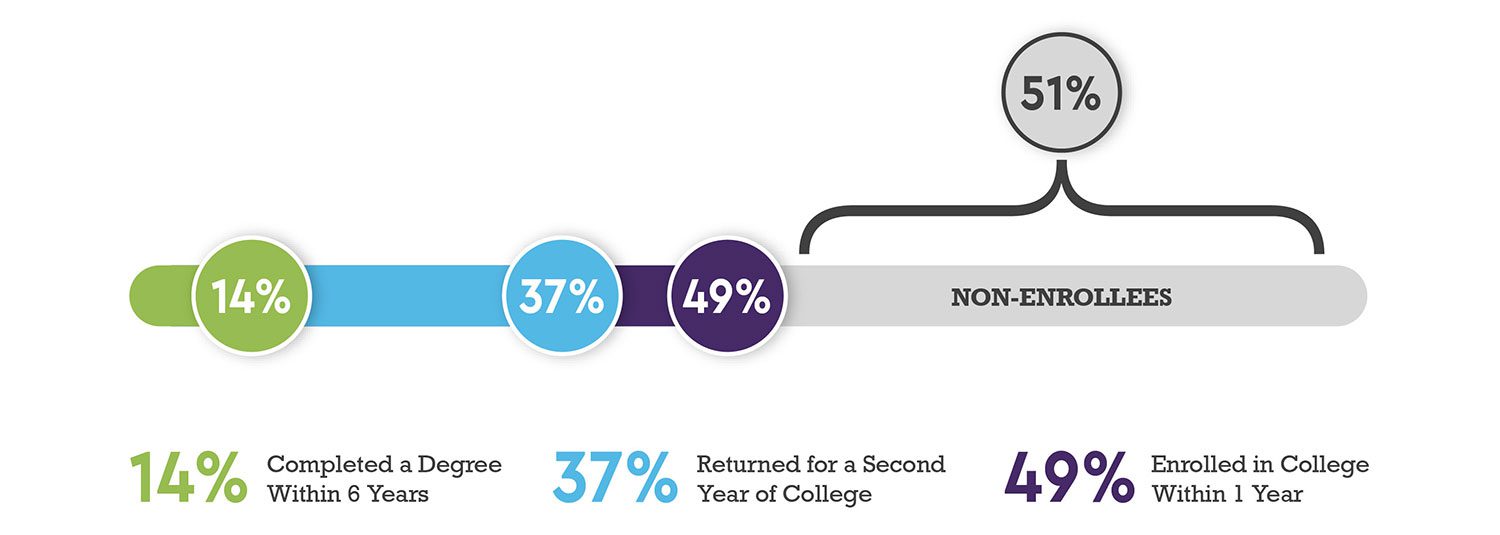About Us
History of the Compact
In 2010, Cleveland Mayor Frank Jackson and many other leaders in the community had identified the below steadily growing college attainment gap as an urgent threat to the social and economic development of Greater Cleveland.
Many organizations recognized the importance of college attainment and aligned their efforts through a shared collective impact strategy that would best use the city’s limited resources. The result was the Higher Education Compact of Greater Cleveland. Participating institutions agreed to share data, collaborate across institutions, and implement organization-specific actions plans to focus on improving educational attainment rates of CMSD students.
Our Work and Accomplishments
Over the last ten years, our work has been impactful because we have been able to deepen relationships within and outside of the Compact. This has allowed us to break down silos and work together in ways we never had before.
CMSD high school 4-year graduation rate
(Class of 2021)
%
Baseline (2012)
%
2022
%
Change
CMSD graduate college enrollment rate
%
Baseline (2012)
%
2021
%
Change
CMSD graduate college completion rate
Four-year institutions (Class of 2015)
%
Baseline (2012)
%
2021
%
Change
Two-year institutions (Class of 2018)
%
Baseline (2012)
%
2021
%
Change
Student Outcomes
Since the Compact began tracking CMSD data in 2011, two specific outcomes have shown incredible progress – first year persistence and college completion.
First year persistence:
- The percentage of CMSD graduates retained in all Compact institutions from year one to year two has increased by 8 percentage points, from 49% for the Class of 2010 to 57% for the Class of 2020.
College Completion:
- The three-year college completion rate at two-year institutions has increased 13 percentage points, from 2% for the Class of 2008 to 15% for the Class of 2018.
- The six-year completion rate at four-year institutions has increased 15 percentage points, from 28% for the Class of 2005 to 43% for the Class of 2015.
A large part of this success can be attributed to the dedicated student retention programs for CMSD graduates at Cuyahoga Community College, Cleveland State University, and Ohio State University.
College Affordability
Since launching, Compact staff have been strong advocates for increasing college affordability in Ohio. In 2016, our report on college affordability in Ohio identified three main challenges:
This inspired Cleveland leadership to convene collective impact initiatives from across the state to organize around the issue of college affordability. Between 2017 and 2019, members of this coalition met with community organizations and legislative representatives to advance an agenda around increasing college affordability. This statewide effort led to the passing of a new state budget in June 2019 that included increases in the Ohio College Opportunity Grant (OCOG) – the state’s only need-based aid grant program.
This work, followed by the launch of the Say Yes Cleveland scholarship program in 2019, has changed the landscape of college affordability for Cleveland students.
Partnerships and Best Practices
The Compact works closely with local partners and state and national networks to support educational attainment in Cleveland and across Ohio. Some of these partnerships include:
Our Staff
By design, the Compact utilizes a lean organizational structure that leverages and aligns existing institutional partner resources. The work of the Compact is coordinated by Executive Director Maggie McGrath.
It is monitored by an advisory committee of senior leaders from participating entities including the Cleveland Metropolitan School District, City of Cleveland, the Cleveland Foundation, the George Gund Foundation, the Martha Holden Jennings Foundation, Say Yes Cleveland, Greater Cleveland Partnership, Cuyahoga Community College, Cleveland State University, Ohio State University, and College Now Greater Cleveland.
The Compact’s work would not be possible without loaned staff support of Anthony Battaglia, Director of College and Career Readiness at the Cleveland Metropolitan School District; Laurel Wilder, Senior Director of Marketing and Communications at College Now Greater Cleveland; Jason Smith, Data Analysis Manager from the Cleveland Metropolitan School District; and Kate Schwab, Director of Program Operations at College Now Greater Cleveland.

